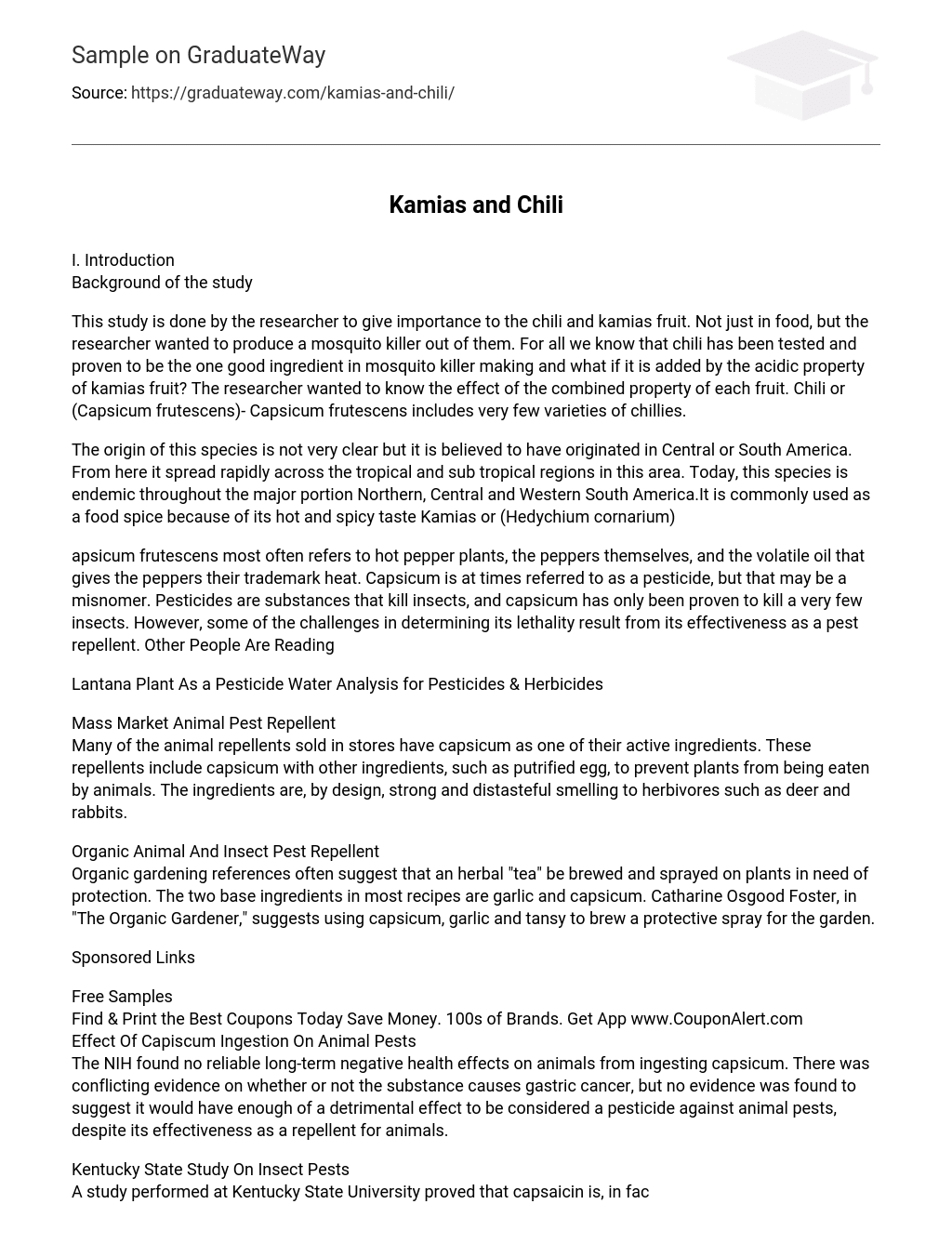I. Introduction
Background of the study
This study is done by the researcher to give importance to the chili and kamias fruit. Not just in food, but the researcher wanted to produce a mosquito killer out of them. For all we know that chili has been tested and proven to be the one good ingredient in mosquito killer making and what if it is added by the acidic property of kamias fruit? The researcher wanted to know the effect of the combined property of each fruit. Chili or (Capsicum frutescens)- Capsicum frutescens includes very few varieties of chillies.
The origin of this species is not very clear but it is believed to have originated in Central or South America. From here it spread rapidly across the tropical and sub tropical regions in this area. Today, this species is endemic throughout the major portion Northern, Central and Western South America.It is commonly used as a food spice because of its hot and spicy taste Kamias or (Hedychium cornarium)
apsicum frutescens most often refers to hot pepper plants, the peppers themselves, and the volatile oil that gives the peppers their trademark heat. Capsicum is at times referred to as a pesticide, but that may be a misnomer. Pesticides are substances that kill insects, and capsicum has only been proven to kill a very few insects. However, some of the challenges in determining its lethality result from its effectiveness as a pest repellent. Other People Are Reading
Lantana Plant As a Pesticide Water Analysis for Pesticides & Herbicides
Mass Market Animal Pest Repellent
Many of the animal repellents sold in stores have capsicum as one of their active ingredients. These repellents include capsicum with other ingredients, such as putrified egg, to prevent plants from being eaten by animals. The ingredients are, by design, strong and distasteful smelling to herbivores such as deer and rabbits.
Organic Animal And Insect Pest Repellent
Organic gardening references often suggest that an herbal “tea” be brewed and sprayed on plants in need of protection. The two base ingredients in most recipes are garlic and capsicum. Catharine Osgood Foster, in “The Organic Gardener,” suggests using capsicum, garlic and tansy to brew a protective spray for the garden.
Sponsored Links
Free Samples
Find & Print the Best Coupons Today Save Money. 100s of Brands. Get App www.CouponAlert.com
Effect Of Capiscum Ingestion On Animal Pests
The NIH found no reliable long-term negative health effects on animals from ingesting capsicum. There was conflicting evidence on whether or not the substance causes gastric cancer, but no evidence was found to suggest it would have enough of a detrimental effect to be considered a pesticide against animal pests, despite its effectiveness as a repellent for animals.
Kentucky State Study On Insect Pests
A study performed at Kentucky State University proved that capsaicin is, in fact, fatal to the cabbage looper insect. Their methodology required that the insects being tested walk across a surface covered in capsaicin oil; the loopers did so and died soon after. However, the spider mites that were studied would not cross the oil to permit observation of its impact, showing the oil was 100 percent effective as a mite repellent here.
Pest Repellents Vs. Pesticides
In dealing with pests, both animal and insect, repellents are usually preferable to pesticides. First, treatments that kill pests give the insects an opportunity to injure the plant before they die; an opening as small as the mouth of an aphid can allow a virus to enter the plant, creating an even bigger problem. Furthermore, pesticides are usually fatal to beneficial insects, including those that would normally prey on garden pests.





